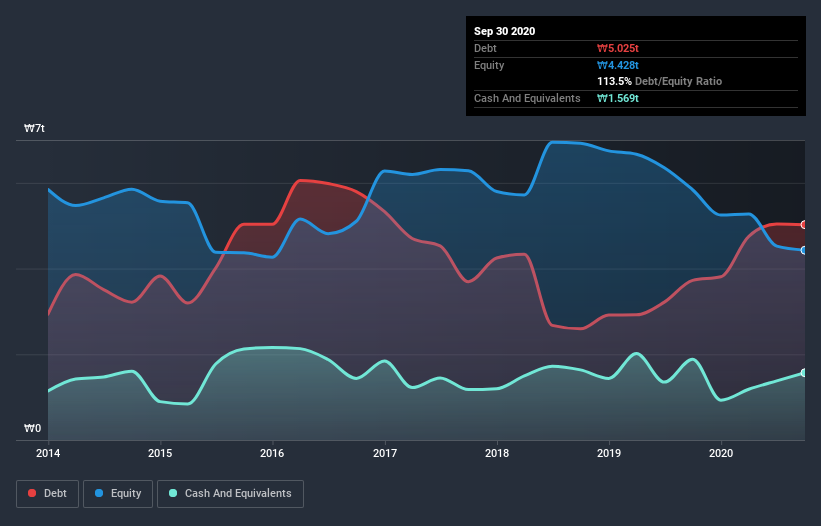- South Korea
- /
- Machinery
- /
- KOSE:A010140
Is Samsung Heavy Industries (KRX:010140) Using Debt In A Risky Way?

David Iben put it well when he said, 'Volatility is not a risk we care about. What we care about is avoiding the permanent loss of capital.' So it seems the smart money knows that debt - which is usually involved in bankruptcies - is a very important factor, when you assess how risky a company is. We note that Samsung Heavy Industries Co., Ltd. (KRX:010140) does have debt on its balance sheet. But the real question is whether this debt is making the company risky.
When Is Debt Dangerous?
Generally speaking, debt only becomes a real problem when a company can't easily pay it off, either by raising capital or with its own cash flow. Ultimately, if the company can't fulfill its legal obligations to repay debt, shareholders could walk away with nothing. However, a more common (but still painful) scenario is that it has to raise new equity capital at a low price, thus permanently diluting shareholders. Of course, debt can be an important tool in businesses, particularly capital heavy businesses. When we examine debt levels, we first consider both cash and debt levels, together.
Check out our latest analysis for Samsung Heavy Industries
What Is Samsung Heavy Industries's Debt?
As you can see below, at the end of September 2020, Samsung Heavy Industries had ₩5.03t of debt, up from ₩3.72t a year ago. Click the image for more detail. However, because it has a cash reserve of ₩1.57t, its net debt is less, at about ₩3.46t.

How Healthy Is Samsung Heavy Industries's Balance Sheet?
The latest balance sheet data shows that Samsung Heavy Industries had liabilities of ₩7.39t due within a year, and liabilities of ₩1.85t falling due after that. On the other hand, it had cash of ₩1.57t and ₩182.4b worth of receivables due within a year. So its liabilities total ₩7.49t more than the combination of its cash and short-term receivables.
This deficit casts a shadow over the ₩4.25t company, like a colossus towering over mere mortals. So we definitely think shareholders need to watch this one closely. At the end of the day, Samsung Heavy Industries would probably need a major re-capitalization if its creditors were to demand repayment. The balance sheet is clearly the area to focus on when you are analysing debt. But ultimately the future profitability of the business will decide if Samsung Heavy Industries can strengthen its balance sheet over time. So if you want to see what the professionals think, you might find this free report on analyst profit forecasts to be interesting.
In the last year Samsung Heavy Industries wasn't profitable at an EBIT level, but managed to grow its revenue by 12%, to ₩7.4t. We usually like to see faster growth from unprofitable companies, but each to their own.
Caveat Emptor
Over the last twelve months Samsung Heavy Industries produced an earnings before interest and tax (EBIT) loss. Its EBIT loss was a whopping ₩984b. Considering that alongside the liabilities mentioned above make us nervous about the company. We'd want to see some strong near-term improvements before getting too interested in the stock. Not least because it burned through ₩905b in negative free cash flow over the last year. So suffice it to say we consider the stock to be risky. There's no doubt that we learn most about debt from the balance sheet. But ultimately, every company can contain risks that exist outside of the balance sheet. Consider risks, for instance. Every company has them, and we've spotted 2 warning signs for Samsung Heavy Industries you should know about.
At the end of the day, it's often better to focus on companies that are free from net debt. You can access our special list of such companies (all with a track record of profit growth). It's free.
When trading Samsung Heavy Industries or any other investment, use the platform considered by many to be the Professional's Gateway to the Worlds Market, Interactive Brokers. You get the lowest-cost* trading on stocks, options, futures, forex, bonds and funds worldwide from a single integrated account. Promoted
New: Manage All Your Stock Portfolios in One Place
We've created the ultimate portfolio companion for stock investors, and it's free.
• Connect an unlimited number of Portfolios and see your total in one currency
• Be alerted to new Warning Signs or Risks via email or mobile
• Track the Fair Value of your stocks
This article by Simply Wall St is general in nature. It does not constitute a recommendation to buy or sell any stock, and does not take account of your objectives, or your financial situation. We aim to bring you long-term focused analysis driven by fundamental data. Note that our analysis may not factor in the latest price-sensitive company announcements or qualitative material. Simply Wall St has no position in any stocks mentioned.
*Interactive Brokers Rated Lowest Cost Broker by StockBrokers.com Annual Online Review 2020
Have feedback on this article? Concerned about the content? Get in touch with us directly. Alternatively, email editorial-team (at) simplywallst.com.
About KOSE:A010140
Samsung Heavy Industries
Engages in the shipbuilding, offshore, and energy and infra businesses worldwide.
Good value with reasonable growth potential.

